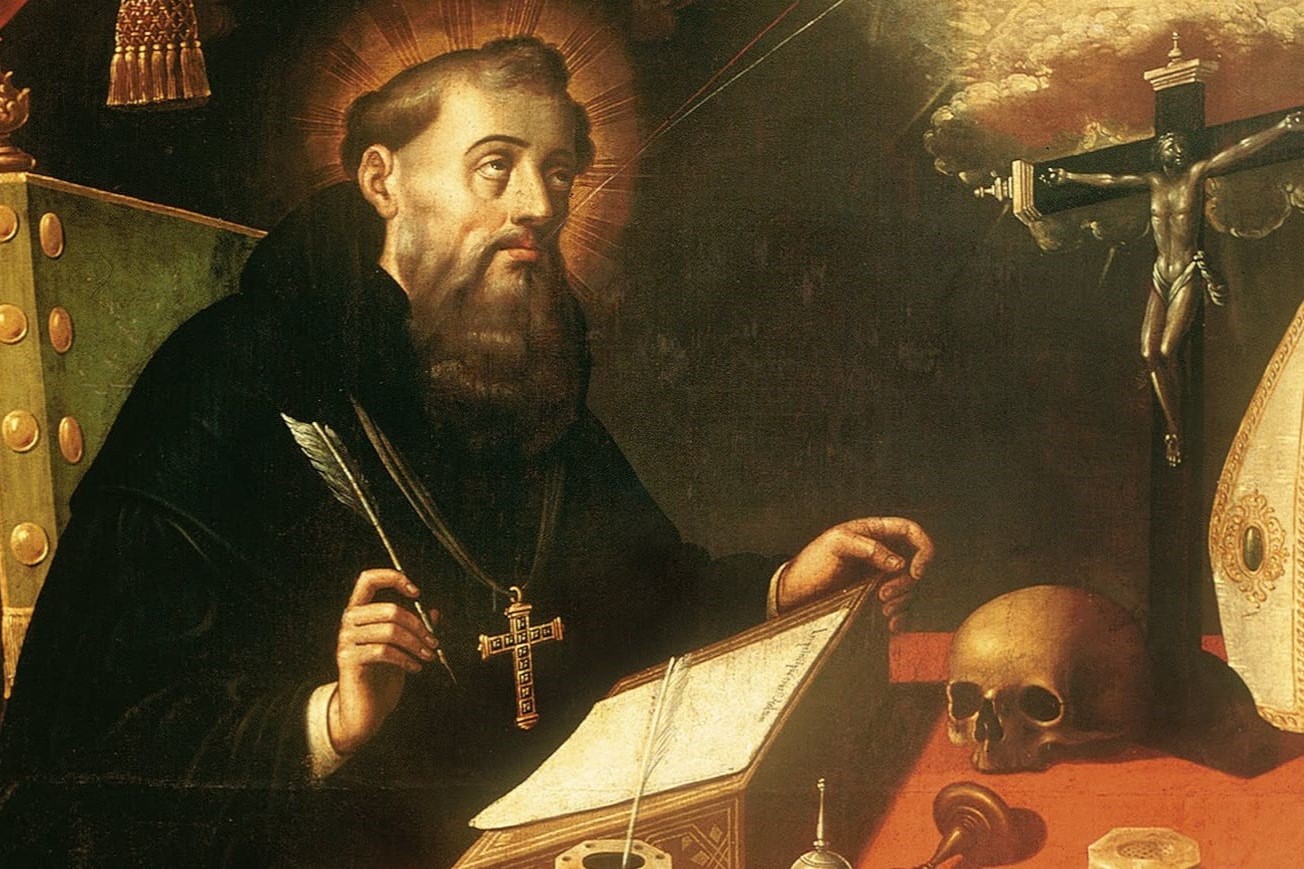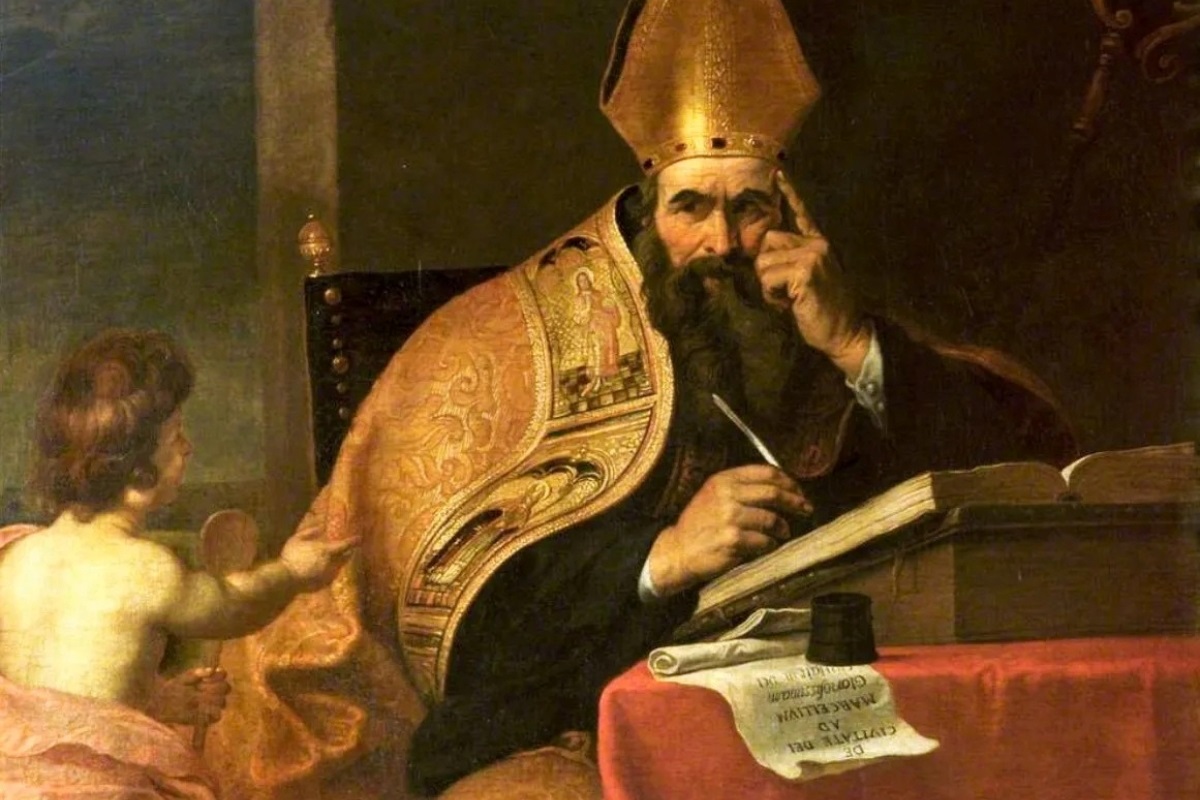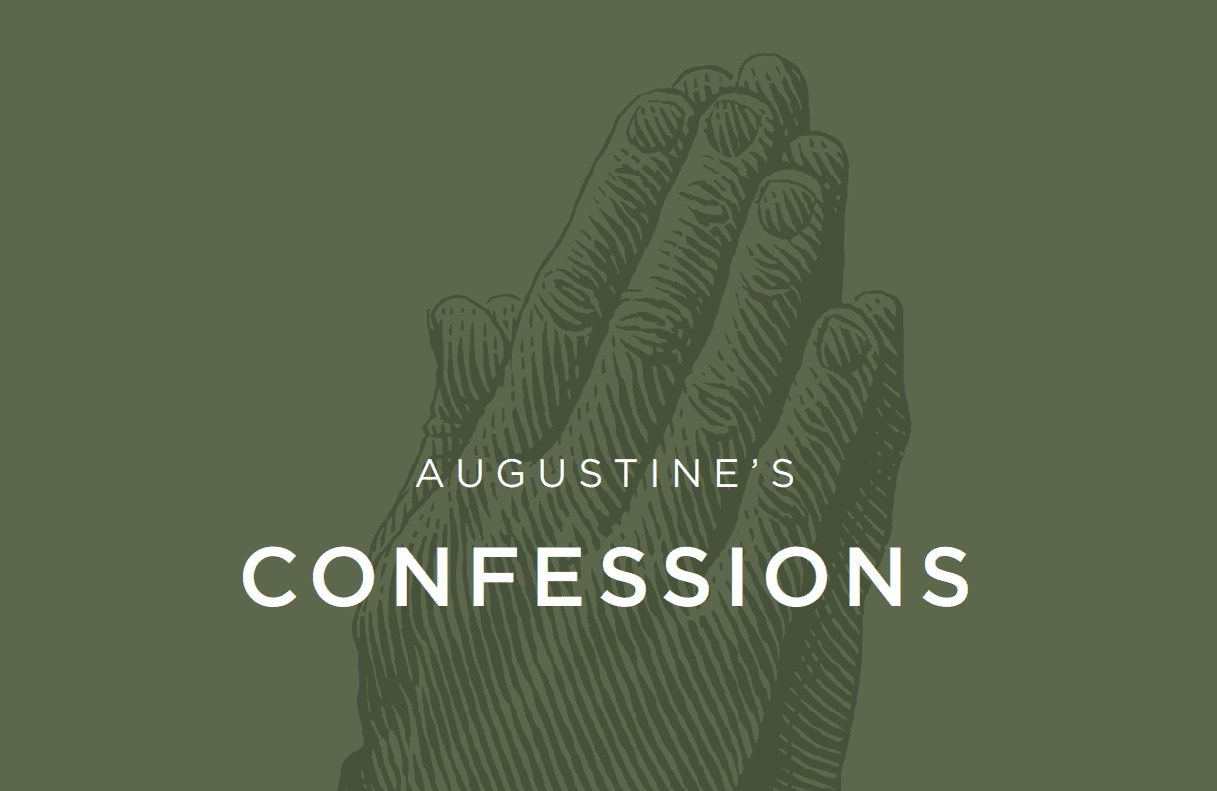Home>Theology and Spirituality>Which Movement Is Most Likely To Study And Adopt The Teachings Of Augustine


Theology and Spirituality
Which Movement Is Most Likely To Study And Adopt The Teachings Of Augustine
Published: February 10, 2024
Ericka Andersen, an editor at Christian.net, expertly merges digital strategy with content creation, focusing on faith and societal issues. Her communication skills enhance the platform's engaging narratives, fostering meaningful dialogue on belief's impact on society.
Discover which theological movement is most likely to study and adopt the teachings of Augustine. Explore the intersection of theology and spirituality to gain valuable insights.
(Many of the links in this article redirect to a specific reviewed product. Your purchase of these products through affiliate links helps to generate commission for Christian.net, at no extra cost. Learn more)
Table of Contents
Introduction
Augustine of Hippo, also known as Saint Augustine, was a prominent theologian and philosopher whose teachings have significantly influenced Christian thought and theology. His profound insights on topics such as grace, original sin, and the nature of God continue to resonate with theologians, scholars, and spiritual seekers across the globe. As a result, various Christian movements have been drawn to study and adopt Augustine's teachings, seeking to integrate his profound wisdom into their theological frameworks and spiritual practices.
Throughout history, Augustine's writings have sparked intense theological debates and have been a source of inspiration for numerous Christian denominations. His emphasis on the sovereignty of God, the fallen nature of humanity, and the transformative power of grace has left an indelible mark on Christian theology, shaping the beliefs and practices of diverse Christian communities.
In this article, we will explore which Christian movement is most likely to study and adopt the teachings of Augustine. By examining the theological inclinations and historical connections of different Christian denominations, we can gain valuable insights into the enduring impact of Augustine's teachings and their resonance within contemporary Christian traditions. Let us embark on a journey through the theological landscapes of various Christian movements, seeking to uncover the enduring influence of Augustine's profound wisdom and its relevance in today's spiritual discourse.
Overview of Augustine's Teachings
Augustine of Hippo, a towering figure in Christian theology, expounded a rich tapestry of teachings that continue to shape the theological landscape of Christianity. Central to Augustine's thought is the concept of original sin, which asserts that all humans inherit a sinful nature as a consequence of Adam and Eve's transgression in the Garden of Eden. This foundational doctrine has profoundly influenced Christian understandings of human nature, sin, and redemption.
Furthermore, Augustine's emphasis on the sovereignty of God and the primacy of divine grace has left an indelible mark on Christian theology. His teachings underscore the belief that salvation is ultimately a result of God's unmerited favor, rather than human effort or merit. This theological perspective has resonated deeply within Christian traditions, informing their understanding of divine agency and human responsibility.
Moreover, Augustine's exploration of the nature of God and the human condition has yielded profound insights into the complexities of faith, reason, and the pursuit of spiritual truth. His writings on the Trinity, the nature of evil, and the relationship between faith and reason have provided fertile ground for theological reflection and contemplation.
Additionally, Augustine's profound articulation of the concept of love, particularly in his seminal work "The City of God," has illuminated the transformative power of love in the Christian life. His nuanced exploration of love as the guiding force in human existence has inspired countless theologians and spiritual seekers, shaping their understanding of the centrality of love in Christian ethics and spirituality.
In summary, Augustine's teachings encompass a wide array of theological themes, including original sin, divine grace, the nature of God, the complexities of faith and reason, and the transformative power of love. His profound insights continue to resonate within Christian theology, serving as a wellspring of wisdom and inspiration for those seeking to deepen their understanding of the Christian faith and its enduring relevance in the modern world.
The Catholic Church
The Catholic Church, with its rich historical legacy and deep theological roots, has been profoundly influenced by the teachings of Augustine of Hippo. As one of the most prominent figures in the early church, Augustine's theological insights have permeated the doctrinal framework and spiritual practices of Catholicism, shaping its understanding of original sin, divine grace, and the nature of God.
Central to Catholic theology is the concept of original sin, a doctrine that finds its roots in Augustine's profound reflections on the fallen nature of humanity. The Catholic Church has embraced Augustine's teachings on original sin, acknowledging the inherent inclination towards sin that permeates human existence. This foundational understanding of human nature has informed Catholic soteriology, emphasizing the need for divine grace and redemption through Christ as the remedy for the effects of original sin.
Furthermore, Augustine's emphasis on the sovereignty of God and the primacy of divine grace has resonated deeply within Catholic theology. The Catholic Church upholds the belief in the unmerited nature of God's grace, affirming that salvation is ultimately a result of God's benevolence and not merely a product of human effort. Augustine's profound articulation of grace as the transformative agent in the lives of believers has found resonance within Catholic spiritual formation and the sacramental life of the Church.
Moreover, Augustine's theological contributions have significantly influenced Catholic understandings of the nature of God, the Trinity, and the complexities of faith and reason. His profound insights into the mysteries of faith have provided a theological foundation for Catholic doctrine and theological inquiry, fostering a robust tradition of intellectual engagement and spiritual contemplation within the Catholic intellectual tradition.
Additionally, Augustine's profound articulation of the transformative power of love has deeply impacted Catholic spirituality and ethical teachings. His emphasis on the centrality of love as the guiding force in human existence has found expression in Catholic moral theology, emphasizing the imperative of love in shaping virtuous lives and fostering compassionate communities.
In essence, the teachings of Augustine of Hippo have left an indelible mark on the theological landscape of the Catholic Church, permeating its doctrinal formulations, spiritual practices, and ethical teachings. His profound insights continue to inspire and guide Catholic theologians, scholars, and spiritual seekers, underscoring the enduring relevance of Augustine's wisdom within the rich tapestry of Catholic tradition.
The Protestant Reformation
The Protestant Reformation, a pivotal movement in the history of Christianity, was profoundly shaped by the theological legacy of Augustine of Hippo. Emerging in the 16th century as a response to perceived theological and institutional shortcomings within the Catholic Church, the Protestant Reformation sought to reform and renew the Christian faith, drawing upon Augustine's teachings to articulate its theological convictions and spiritual ethos.
At the heart of the Protestant Reformation was a fervent emphasis on the primacy of divine grace and the sovereignty of God in the process of salvation, echoing Augustine's profound insights into the transformative power of grace and the unmerited nature of God's favor. Influential figures such as Martin Luther, John Calvin, and other Reformers drew inspiration from Augustine's writings on grace and redemption, shaping their theological formulations and doctrinal emphases. The Reformation's foundational doctrine of justification by faith alone, a central tenet espoused by Luther and Calvin, reflects Augustine's emphasis on the unmerited nature of salvation and the transformative agency of divine grace in the lives of believers.
Furthermore, the Protestant Reformation's critique of human sinfulness and its pervasive impact on human nature resonates with Augustine's teachings on original sin and the fallen condition of humanity. The Reformers, influenced by Augustine's profound reflections on the human predicament, underscored the radical nature of sin and the need for divine intervention in the process of redemption. This theological alignment with Augustine's teachings on original sin and human depravity provided a robust theological foundation for the Reformation's critique of the Catholic Church's teachings and practices.
Moreover, the Protestant Reformation's emphasis on the priesthood of all believers and the authority of Scripture as the ultimate source of divine revelation reflects Augustine's broader theological framework, which emphasized the centrality of the Word of God and the spiritual agency of all believers. The Reformers, drawing upon Augustine's writings on the nature of the church and the authority of Scripture, sought to reorient Christian ecclesiology and spiritual authority, advocating for a more direct and personal engagement with the sacred texts and the spiritual life of believers.
In essence, the Protestant Reformation, with its theological convictions and ecclesial reforms, bears the indelible imprint of Augustine's profound wisdom and theological insights. His teachings on grace, original sin, and the nature of God provided a fertile theological foundation for the Reformers' critique of the Catholic Church and their vision for a renewed expression of the Christian faith. The enduring influence of Augustine's teachings within the Protestant Reformation underscores the timeless relevance of his theological legacy and its enduring impact on the diverse tapestry of Christian traditions.
The Eastern Orthodox Church
The Eastern Orthodox Church, with its rich theological heritage and distinctive spiritual traditions, has been profoundly influenced by the teachings of Augustine of Hippo. As a prominent figure in the early Christian church, Augustine's theological insights have permeated the doctrinal framework and spiritual ethos of Eastern Orthodoxy, shaping its understanding of key theological concepts and spiritual practices.
Central to Eastern Orthodox theology is the concept of original sin, a doctrine that finds resonance in Augustine's profound reflections on the fallen nature of humanity. The Eastern Orthodox Church acknowledges the impact of original sin on human existence, emphasizing the need for redemption and spiritual restoration. Augustine's teachings on the pervasive nature of sin and the human longing for divine grace have informed Orthodox soteriology, underscoring the transformative power of God's redemptive love in the lives of believers.
Furthermore, Augustine's emphasis on the sovereignty of God and the primacy of divine grace has resonated deeply within Eastern Orthodox theology. The Eastern Orthodox Church upholds the belief in the unmerited nature of God's grace, affirming that salvation is ultimately a result of God's benevolence and mercy. Augustine's profound articulation of grace as the transformative agent in the lives of believers has found expression in the sacramental life and spiritual disciplines of Eastern Orthodoxy, emphasizing the transformative power of the divine mysteries and the sanctifying work of the Holy Spirit.
Moreover, Augustine's theological contributions have significantly influenced Eastern Orthodox understandings of the nature of God, the Trinity, and the complexities of faith and reason. His profound insights into the mysteries of faith have provided a theological foundation for Orthodox doctrine and spiritual contemplation, fostering a rich tradition of theological inquiry and spiritual reflection within the Eastern Orthodox tradition.
Additionally, Augustine's profound articulation of the transformative power of love has deeply impacted Eastern Orthodox spirituality and ethical teachings. His emphasis on the centrality of love as the guiding force in human existence has found expression in Orthodox asceticism, emphasizing the cultivation of selfless love and compassion as essential aspects of the Christian life.
In essence, the teachings of Augustine of Hippo have left an indelible mark on the theological landscape of the Eastern Orthodox Church, permeating its doctrinal formulations, spiritual practices, and ethical teachings. His profound insights continue to inspire and guide Orthodox theologians, scholars, and spiritual seekers, underscoring the enduring relevance of Augustine's wisdom within the rich tapestry of Eastern Orthodox tradition.
The Anglican Communion
The Anglican Communion, a global family of churches with roots in the Church of England, has been significantly influenced by the teachings of Augustine of Hippo. Augustine's profound theological insights have permeated the doctrinal framework and spiritual ethos of Anglicanism, shaping its understanding of key theological concepts and spiritual practices.
Central to Anglican theology is the concept of original sin, a doctrine that finds resonance in Augustine's profound reflections on the fallen nature of humanity. The Anglican Communion acknowledges the impact of original sin on human existence, emphasizing the need for redemption and spiritual restoration. Augustine's teachings on the pervasive nature of sin and the human longing for divine grace have informed Anglican soteriology, underscoring the transformative power of God's redemptive love in the lives of believers.
Furthermore, Augustine's emphasis on the sovereignty of God and the primacy of divine grace has resonated deeply within Anglican theology. The Anglican Communion upholds the belief in the unmerited nature of God's grace, affirming that salvation is ultimately a result of God's benevolence and mercy. Augustine's profound articulation of grace as the transformative agent in the lives of believers has found expression in Anglican liturgical and sacramental practices, emphasizing the transformative power of the sacraments and the sanctifying work of the Holy Spirit in the life of the Church.
Moreover, Augustine's theological contributions have significantly influenced Anglican understandings of the nature of God, the Trinity, and the complexities of faith and reason. His profound insights into the mysteries of faith have provided a theological foundation for Anglican doctrine and spiritual contemplation, fostering a rich tradition of theological inquiry and spiritual reflection within the Anglican tradition.
Additionally, Augustine's profound articulation of the transformative power of love has deeply impacted Anglican spirituality and ethical teachings. His emphasis on the centrality of love as the guiding force in human existence has found expression in Anglican moral theology, emphasizing the imperative of love in shaping virtuous lives and fostering compassionate communities.
In essence, the teachings of Augustine of Hippo have left an indelible mark on the theological landscape of the Anglican Communion, permeating its doctrinal formulations, spiritual practices, and ethical teachings. His profound insights continue to inspire and guide Anglican theologians, scholars, and spiritual seekers, underscoring the enduring relevance of Augustine's wisdom within the rich tapestry of Anglican tradition.
The Lutheran Church
The Lutheran Church, with its deep roots in the Protestant Reformation, has been profoundly shaped by the theological legacy of Augustine of Hippo. As a pivotal figure in the history of Christian thought, Augustine's profound insights into grace, original sin, and the sovereignty of God have left an indelible mark on Lutheran theology, shaping its doctrinal formulations and spiritual ethos.
At the heart of Lutheran theology lies a robust emphasis on the primacy of divine grace and the sovereignty of God in the process of salvation, echoing Augustine's profound teachings on the transformative power of grace and the unmerited nature of God's favor. Influential figures such as Martin Luther, the founder of Lutheranism, drew inspiration from Augustine's writings on grace and redemption, shaping their theological convictions and doctrinal emphases. The Lutheran emphasis on justification by faith alone, a central tenet of Lutheran theology, reflects Augustine's emphasis on the unmerited nature of salvation and the transformative agency of divine grace in the lives of believers.
Furthermore, Lutheranism's affirmation of the radical nature of human sinfulness and the pervasive impact of sin on human nature resonates with Augustine's teachings on original sin and the fallen condition of humanity. Luther, deeply influenced by Augustine's profound reflections on the human predicament, underscored the need for divine intervention in the process of redemption, aligning with Augustine's emphasis on the transformative power of grace in overcoming the effects of sin.
Moreover, the Lutheran emphasis on the authority of Scripture as the ultimate source of divine revelation reflects Augustine's broader theological framework, which emphasized the centrality of the Word of God and the spiritual agency of all believers. Luther's commitment to sola scriptura, the principle that the Bible serves as the ultimate authority in matters of faith and practice, resonates with Augustine's emphasis on the transformative power of the sacred texts and the spiritual agency of believers in engaging with the Word of God.
In essence, the Lutheran Church, with its theological convictions and ecclesial distinctiveness, bears the enduring imprint of Augustine's profound wisdom and theological insights. His teachings on grace, original sin, and the nature of God have provided a fertile theological foundation for Lutheranism, shaping its doctrinal formulations and spiritual ethos. The enduring influence of Augustine's teachings within the Lutheran tradition underscores the timeless relevance of his theological legacy and its enduring impact on the diverse tapestry of Christian traditions.
The Methodist Church
The Methodist Church, with its rich heritage of Wesleyan theology and spiritual fervor, has been profoundly influenced by the teachings of Augustine of Hippo. As a pivotal figure in Christian history, Augustine's profound insights into grace, original sin, and the sovereignty of God have significantly shaped Methodist theology, informing its doctrinal formulations and spiritual practices.
Central to Methodist theology is the concept of prevenient grace, a foundational doctrine that finds resonance in Augustine's teachings on the transformative power of divine grace. Prevenient grace, as articulated by John Wesley, the founder of Methodism, reflects Augustine's emphasis on the unmerited nature of God's grace, affirming that God's grace precedes and enables human response to the gospel. Augustine's profound reflections on the primacy of divine grace have informed Methodist soteriology, emphasizing the prevenient, justifying, and sanctifying dimensions of God's redemptive work in the lives of believers.
Furthermore, Augustine's emphasis on the sovereignty of God and the transformative agency of grace has resonated deeply within Methodist theology. The Methodist Church upholds the belief in the unmerited nature of God's grace, affirming that salvation is ultimately a result of God's benevolence and mercy. Augustine's profound articulation of grace as the transformative agent in the lives of believers has found expression in Methodist spiritual disciplines and the Wesleyan emphasis on holiness, underscoring the transformative power of God's grace in shaping the character and conduct of believers.
Moreover, Augustine's theological contributions have significantly influenced Methodist understandings of the nature of God, the Trinity, and the complexities of faith and reason. His profound insights into the mysteries of faith have provided a theological foundation for Methodist doctrine and spiritual contemplation, fostering a rich tradition of theological inquiry and spiritual reflection within the Methodist tradition.
Additionally, Augustine's profound articulation of the transformative power of love has deeply impacted Methodist spirituality and ethical teachings. His emphasis on the centrality of love as the guiding force in human existence has found expression in Methodist social outreach, emphasizing the imperative of love in addressing social injustices and fostering compassionate communities.
In essence, the teachings of Augustine of Hippo have left an indelible mark on the theological landscape of the Methodist Church, permeating its doctrinal formulations, spiritual practices, and ethical teachings. His profound insights continue to inspire and guide Methodist theologians, scholars, and spiritual seekers, underscoring the enduring relevance of Augustine's wisdom within the rich tapestry of Methodist tradition.
Conclusion
In conclusion, the teachings of Augustine of Hippo have exerted a profound and enduring influence on a diverse array of Christian movements, shaping their theological convictions, spiritual practices, and ethical teachings. Augustine's profound insights into grace, original sin, the sovereignty of God, and the transformative power of love have resonated deeply within the theological landscapes of the Catholic Church, the Protestant Reformation, the Eastern Orthodox Church, the Anglican Communion, the Lutheran Church, and the Methodist Church.
Throughout history, Augustine's teachings have served as a theological lodestar, guiding Christian communities in their reflections on the complexities of human nature, the mysteries of faith, and the transformative power of divine grace. His emphasis on the unmerited nature of God's favor and the radical impact of sin on human existence has provided a robust theological foundation for diverse Christian traditions, fostering a rich tapestry of theological inquiry and spiritual contemplation.
The Catholic Church, with its deep historical roots and doctrinal richness, has been profoundly shaped by Augustine's teachings on original sin, divine grace, and the nature of God. His theological insights have permeated Catholic soteriology, spiritual practices, and ethical teachings, underscoring the enduring relevance of Augustine's wisdom within the rich tapestry of Catholic tradition.
The Protestant Reformation, a transformative movement in the history of Christianity, drew inspiration from Augustine's teachings on grace, original sin, and the sovereignty of God. The Reformers' emphasis on justification by faith alone and the authority of Scripture reflects Augustine's profound theological legacy, highlighting the enduring impact of his teachings within the diverse tapestry of Protestant traditions.
Similarly, the Eastern Orthodox Church, the Anglican Communion, the Lutheran Church, and the Methodist Church have all been deeply influenced by Augustine's profound insights, integrating his theological wisdom into their doctrinal formulations, spiritual practices, and ethical teachings. Augustine's emphasis on the transformative power of love, the unmerited nature of grace, and the complexities of faith and reason has provided a theological compass for these diverse Christian movements, guiding their theological reflections and spiritual aspirations.
In essence, Augustine's teachings continue to resonate within the theological discourse of contemporary Christian traditions, serving as a source of inspiration and theological insight for theologians, scholars, and spiritual seekers. His enduring legacy underscores the timeless relevance of his theological wisdom, inviting Christian communities to engage with the profound insights of this eminent theologian and philosopher as they navigate the complexities of faith, reason, and the human quest for spiritual truth.



